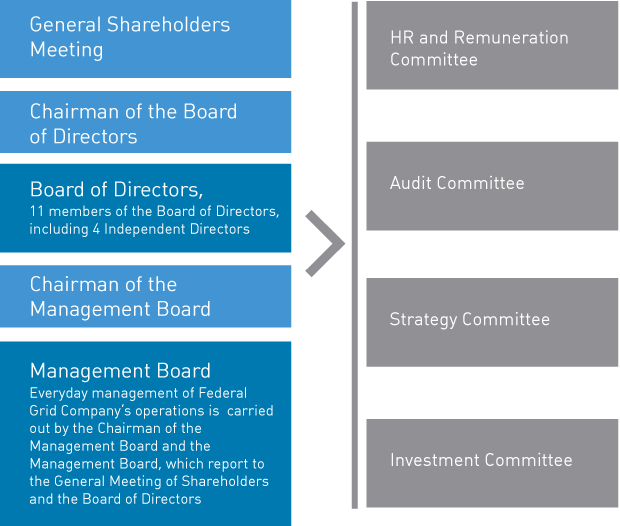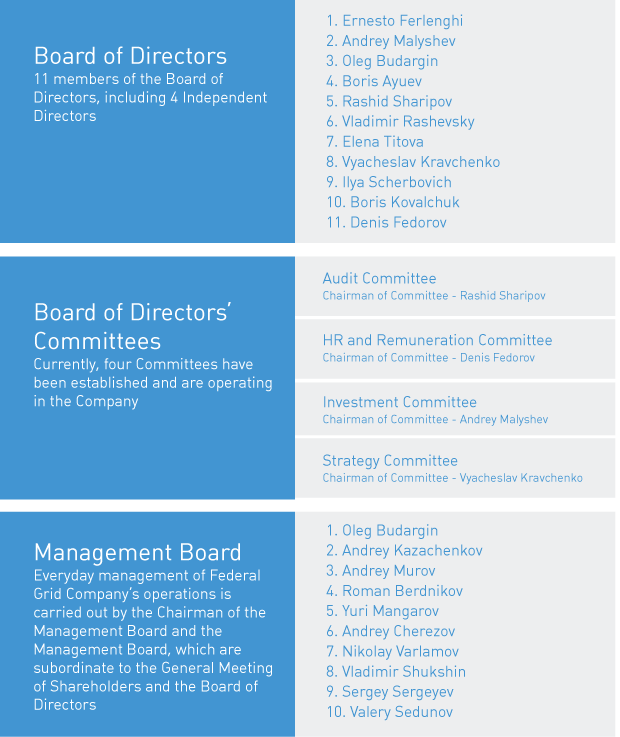Federal Grid Company’s Governance Structure
The Company's supreme management body is the General Meeting of Shareholders. The Board of Directors determines the strategy and main areas of the Company’s development and supervises the operations of the executive bodies in the interests of the Company and its shareholders.
In its activities, the Board of Directors of Federal Grid Company is guided by the Federal Law “On Joint Stock Companies”, Russian legislation and the Company’s internal documents: the Articles of Association, the Code of Corporate Governance, the Regulations of the Board of Directors Activities.
The Board of Directors shall be elected by the General Meeting of Shareholders via cumulative voting for a period of one year. The Board shall include 11 members, 6 of whom should be representatives of the State according to the Company's Articles of Association.
Federal Grid Company’s Governance Structure

Composition of the Board of Directors acting from 29 June 2012, Committees of the Board of Directors and the Management Board of Federal Grid Company

According to local regulatory documents of Federal Grid Company, a person performing the functions of the sole executive body may not be at the same time the Chairman of the Board of Directors of the Company.
The members of the Management Board may not comprise more than 25% of the Board of Directors of the Company. The members of the Management Board are allowed to combine their positions in the management bodies of other organizations only with the consent of the Board of Directors of the Company.
The Board of Directors of Federal Grid Company consists of 4 independent directors (out of 11 directors): Vladimir Rashevsky, Chairman of the Management Board, SUEK; Elena Titova, Chairman of the Management Board, All-Russian Regional Development Bank; Rashid Sharipov, Deputy General Director, KFK – Consult; Ilya Shcherbovich, President, United Capital Partners (UCP) Group of Companies.
The Audit Commission is elected annually by the General Meeting of Shareholders to control the Company’s financial and business operations.
In Federal Grid Company there are mechanisms designed to prevent conflicts of interest in the supreme governing body - the Board of Directors:
- The Members of the Board of Directors are recommended that they refrain from dealing in the Company’s securities during the period when they have an access to insider information.
- The Members of the Board of Directors’ obligations not to disclose insider information, as provided by the Regulation "On insider information", shall remain in force for a period not less than six months after the elimination of the grounds on which the person is recognized as an insider, unless a longer period is provided by the agreement between the insider and the Company, or internal documents of the Company.
- The members of the Board of Directors of the Company are required to disclose to the Audit Committee of the Board of Directors of the Company any information on the ownership of the Company’s securities, as well as the sale (no later than 5 days) and/or purchase of the Company’s securities.
- Not later than the third day of the month following the reporting month, insiders are required to submit to the insider information control departmen written declaration of transactions ma during the reporting month with the Company and/or SDCs securities.
In the event of a conflict of interest, the Chairman of the Management Board and Member of the Management Board shall inform the Board of Directors, and refrain from voting on the relevant issues. The Chairman and Members of the Management Board are required to disclose information on the ownership of the Company’s securities, as well as their sale (disposal) and/or acquisition in accordance with the laws of the Russian Federation.
The Company’s shareholders are entitled to manage the supreme governance body or provide recommendations through the following mechanisms:
- Nominating a representative to the Board of Directors, a Committee of the Board of Directors, the Audit Commission;
- Making proposals for the agenda of the General Meeting of Shareholders;
- Summoning an extraordinary General Meeting of Shareholders;
- Direct voting at the General Meeting of Shareholders;
- Requesting for information on the Company’s operations.
In 2012, the Company’s Board of Directors approved a new version of the Regulations on the Internal Control System, according to which the Board of Directors shall take the following measures to supervise how the company assesses its economic, environmental and social efficiency:
- Initiate audits of the Company’s operations via the Chairman of the Management Board;
- Consider and make decisions on the internal control procedure reports submitted by Chairman of the Management Board or the Audit Committee of the Board of Directors;
- Review the results of the internal control (opinions of the Company’s Audit Commission and other materials from the Company’s departments authorized to carry out independent efficiency checking of the financial and economic activity and control procedures);
- Regularly assess the effectiveness of internal control system and continuously improve internal control procedures.
